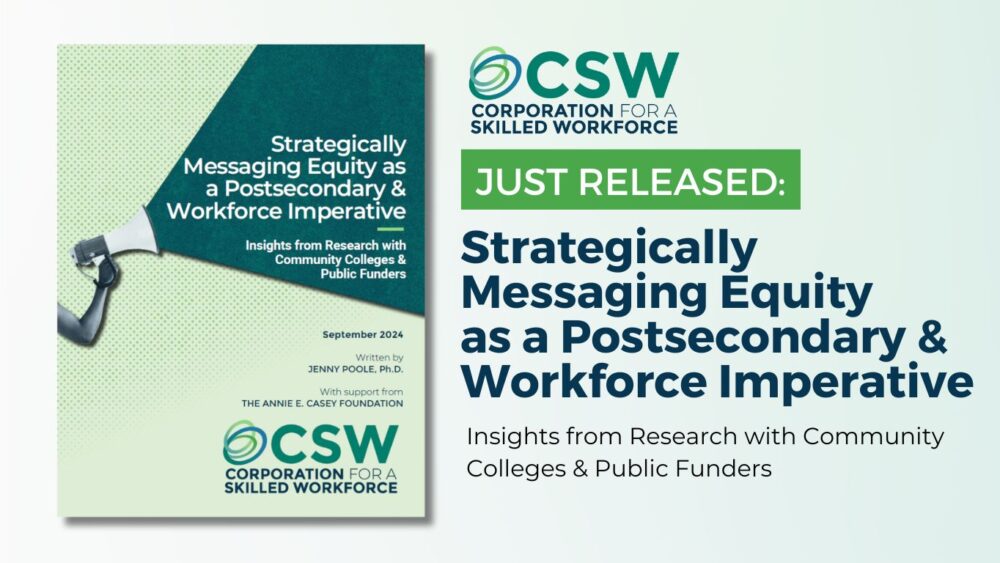The diversity, equity, and inclusion (DEI) landscape in the U.S. is changing fast. With anti-DEI court cases, politics, and activist movements on the rise, organizations are being pushed to rethink how they advance equity, especially racial equity. This is particularly true for American colleges and universities. These institutions, whose missions and goals are deeply tied to equity as both an educational and workforce imperative, face multiple challenges. In this landscape, colleges must get creative in pursuing and messaging their equity work, while continuing to tackle ongoing disparities affecting students, families, and communities across the country.
At Corporation for a Skilled Workforce (CSW), we recently took on a research project, funded by the Annie E. Casey Foundation, to explore how colleges are using strategic messaging to move the needle on equity—especially racial equity—while navigating today’s challenges. As a Senior Policy Associate on CSW’s Competencies & Credentials team, I worked closely with colleges and public funders on this project, while applying my background in public opinion and higher education research. Here’s a sneak peek at what we learned through this project.
Lesson 1: An anti-DEI landscape is just one of the challenges colleges face when advancing equity today.
Our research began with an assumption: that colleges have the power to consistently advance equity when working internally and with their external partners. However, we quickly learned this is not always the case. Colleges vary in their ability to pursue and message equity when working with industry, K-12 schools, community organizations, government agencies, and foundations.
Alongside anti-DEI policies and politics—for instance, attorneys general in 13 states threatening legal action against colleges’ employer partners—numerous challenges disrupt colleges’ equity efforts. These include a lack of sustained funding for equity improvements, limited data capacity, competing needs among diverse student and family groups, and an incomplete knowledge base about what strategies work best in promoting equity, especially racial equity. Fortunately, there are also multiple supports for colleges, too. Our report describes these supports, which are important for colleges and their partners to know.
Lesson 2: Without much intervention, colleges are using multiple strategies to promote equity for students and communities.
Our findings represent a small sample of community colleges–11, to be exact–and thus are intended to be a starting place for more exploration in future research and practice. We at CSW are committed to continuing this research through ongoing work with community colleges and employer partners, including through initiatives like our ACE-UP Community of Practice. Nevertheless, the findings clearly suggest that colleges use multiple strategies when framing equity, especially racial equity, in conversation and collaboration with their partners. By “framing,” we mean how colleges talk about, describe, articulate efforts, or otherwise communicate to advance equity, especially racial equity.
For example, colleges frame equity as the pursuit of equitable outcomes for students of color, as well as equal opportunity for all community college students. They also promote equity through place-based fairness, which benefits entire communities and improves access for historically marginalized groups living within them. Also, colleges promote equity by improving workforce efficiency. For instance, they partner with employers’ HR teams to create inclusive environments and retain workers of color.
Lesson 3: Colleges’ messaging strategies align with approaches recommended by decades of political science and communications research.
As an undergraduate at the University of Virginia, I studied government and American politics, where I learned about research on public opinion and voting behavior. I never imagined I’d someday apply that research to explain a phenomenon in higher education and workforce development! The research and subject matter expertise we cite in our report, spanning decades, shows how strategic framing can increase public support for political issues, including racial equity and affirmative action.
Our findings suggest that colleges regularly frame equity as a postsecondary and workforce imperative, while aligning their messaging with the values of their communities and partners. Prior research shows that this alignment is highly strategic and can help build support for equity initiatives. However, colleges’ efforts to frame and communicate equity may not always be intentionally or strategically guided. We hope this research spurs more work in both research and practice to help colleges and their partners collaborate more effectively in advancing racial equity for students, families, and communities.
Lesson 4: These efforts are just the beginning—more knowledge, resources, and support are needed to drive deeper change.
We know that further research and practice are needed to better understand and support effective strategies for pursuing and messaging equity, particularly in the face of political resistance and anti-DEI legislation. For instance, understanding how equity metrics can be coupled with messaging to support colleges’ equity efforts is key to the pursuit of measurable outcomes. Also, by testing and refining the messaging strategies in this research, colleges can, through practice, promote equity despite their challenges.
Our team at CSW plans to use this research to shape our future strategy and support for two- and four-year colleges, working with their industry and employer partners to improve racial equity for individuals, families, and communities. We invite you to join us in this important work.
Want to learn more? Join us on October 1 at 1:00PM ET, when we will be hosting a webinar to share key findings from our report and dive into a discussion with expert panelists. Register to attend the webinar here.
Meet the Author
Jenny Poole is a Senior Policy Associate with the Competencies & Credentials team, focused on dramatically expanding the use of competencies and non-degree credentials within learning and talent management systems to increase economic mobility for low-wage workers and close racial disparity gaps.




Comments are closed.